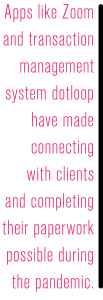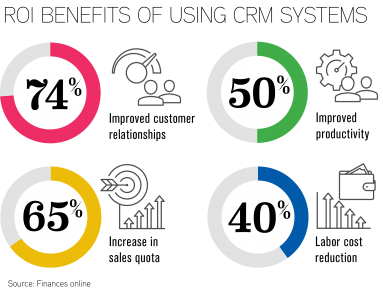The effects of COVID-19 on the real estate industry
By Andrew Conner
The rapid and unexpected spread of COVID-19 affected a vast number of industries in innumerable ways, and the real estate industry was certainly not immune to these changes.

Since March, REALTORS® have been thrust into a brand-new environment—one where buyers, sellers, agents, attorneys, inspectors and all the other people involved in a transaction now posed a very real existential threat to each other.
While attempting to continue serving clients in an atmosphere of pandemic panic, agents came up with a variety of solutions to the problems presented: drive-through closings, videoconference meetings and consultations, virtual open houses, and new cleaning and sanitation processes, among others. REALTORS® stepped up to get their jobs done safely. And now one of the big questions on many agents’ minds is: How many of these news ways of doing business are here to stay?
Remote control
“If you and I were working for the same company and we had a group of people we wanted to get together, we could get a team room and people could sit around a table, and stand up and give presentations,” says Barry Hoey, CRS, broker associate at eXp Realty in Southwest Florida. You might think he is describing his office, but Hoey is actually talking about eXpWorld, a virtual online meeting space used by Hoey and his colleagues at eXp.
EXpWorld is powered by VirBELA, a company that describes its technology as providing an “enterprise-scale 3D world that leverages immersive technology to support … collaboration, events, education or training goals.” In eXpWorld, Hoey, his colleagues and guests can create avatars and move those avatars through a virtual space. Think of it as creating a character in a video game, except instead of building fortresses or killing monsters, you’re meeting in a conference room or giving a presentation in an auditorium. “This is something we already had, but it was only when COVID-19 hit that we realized the importance of it and how it could be utilized in so many ways,” says Hoey. “We actually had a shareholders meeting virtually. We had people from 27 or 28 different countries and everyone went in as avatars, and it was almost the same as a physical meeting. It was very successful and that’s definitely going to continue.”
While 3D meeting spaces may not be the right fit for every agency, Hoey and eXp Realty were not alone in finding new ways to work due to COVID-19. If you’ve been working remotely, you’re probably familiar with the videoconferencing app Zoom, and you won’t be surprised to hear that REALTORS® are taking advantage of it.

“I personally have a team of four people and we worked in an office space,” says Jody Zink, CRS, with RE/MAX Preferred Associates in Toledo, Ohio. “Things changed very quickly when schools closed: Two members of my staff were now also teachers in addition to all of the other things we do on a daily basis. So the first week we were quarantined, I said, ‘Let’s figure this out.’”
Zink explains that apps like Zoom and transaction management system dotloop have made connecting with clients and completing their paperwork possible during the pandemic. She feels that the transition out of office spaces and toward remote work is one that will stay. “I’m still paying rent at the office and I’m wondering, once this blows over, will I need all this space?” says Zink.
Zink also makes an important note for agents who are using technology in larger, more important ways: Prepare for tech support. “I think [the pandemic] has caused a lot of people to have more trust in technology,” she says. “But sometimes you have to provide tech support. We’ve had to help people set up email addresses so they can sign documents electronically. Whatever we have to do to accommodate, we’re happy to do it.”
In real life
While Zink encourages clients to use technology when they can, it can’t replace every aspect of an agent’s job. Earlier this year, Zink made the difficult decision to continue open houses during the lockdown—legally, as real estate was determined an essential business in her state.
“I was concerned about safety and the perception of people driving by the house who saw my name on the sign, but we did it in a way that was very controlled,” she explains. “We had one group at a time, everyone had to wear masks, and all of the doors were open and light switches were on. Groups would exit through a different door than the one they used to enter. I was concerned people were going to be upset due to the limitations, but they were very patient. The experience was good and all of the properties we have shown are under contract—and 90% of them had multiple offers.”
Another way Zink minimized exposure for sellers and buyers was to do home staging consultations virtually. She works with a home stager who usually goes through the entire house with a client, room by room, offering advice on how to best showcase the room. “We’re now doing that virtually and it works well,” says Zink. “And it’s not putting her or my clients at risk.” While Zink doesn’t necessarily see all of the steps she has taken to make open houses safer continuing forever, she thinks they will be around for the foreseeable future, and some may become permanent fixtures of open houses in the future.
For Mike Inman, CRS, with Coldwell Banker McMahan Co. in Lexington, Kentucky, holding open houses during the pandemic was more difficult. “The list of restrictions is very onerous,” he explains. However, he has taken other steps to be able to show houses while still keeping his clients safe. “Even before the pandemic, we were focusing on taking higher-quality pictures and including a video in every listing. For my rural properties, we usually do a drone video, and those have actually done better than the 3D videos. The other thing I do is if someone is leery about seeing a house, I’ll use FaceTime or Zoom to take them through the home.”
Inman intends to continue doing this for all properties going forward. However, the biggest trend he sees is an increase in sight-unseen home purchases. Many agents have seen this activity increase over the past few years, as technology has made it easier to view houses remotely, but Inman says what he is seeing during the pandemic is new.
“I’ve done sales in the past where the buyer doesn’t see the house before closing, but this is a radical difference,” he says. “I had one buyer [during the pandemic] who submitted three offers and didn’t get them—with one we had offered $10,000 over the asking price and we still didn’t get it. Houses regularly sell within one day on the market. That buyer did end up getting a house, which sold the same day it went on the market, and our offer was $6,000 over the listing price.”
Inman sees this trend only increasing as demand rises and inventory can’t match it. “We thought 2020 was going to be the year of baby boomers selling houses and downsizing, but that’s not happening,” he says. “Empty nesters who have a kid in college are now choosing not to downsize because they now have their children living with them again. I think people who would sell are now seeing the extra space as a positive, and people in general are scared of selling a house in this environment.”
With all of these factors, Inman sees a big demand for new construction, especially in his market, and he hopes that will help meet buyers’ needs. Until then, he expects more quick decision-making and sight-unseen homebuyers.
Connecting with clients
As people spend more time in their homes on their devices, reaching them online remains a top priority for REALTORS®, and that won’t be going away. “I think an online presence is more important now than it’s ever been,” says Rob Levy, CRS, with Keller Williams Realty Professionals in Portland, Oregon. “When you look at the big picture, if people aren’t moving as often and your business depends, at least partially, on repeat clients, you could be losing a lot of business. All of a sudden, you need to find new ways of staying in touch. For all of my clients—both buyers and sellers—I send an e-newsletter as well as automated CMAs twice a month, plus the usual snail mail postcards, magnets, calendars and things like that to keep my face in front of them.”

Similar to Levy, Hoey has found that his company’s CRM is becoming more and more of an important tool. The CRM sends out automated property alerts to buyers based on many variables (such as demographic information, price points, online behavior, etc.). “We find that to be effective, and it’s almost like having another person employed,” says Hoey. He points to a recent buyer who received one of these messages, and within a day Hoey was showing the buyer a property.
The increasing importance of technology has been a common theme in the real estate industry for years, and the COVID-19 pandemic is only accelerating that trend. As Hoey says, speaking of the real estate industry in general, “We all need to be a little more creative and not afraid of using technology.”
To stay ahead of the curve, agents should learn to adapt for the long-term. Check out “How to Become a MASTER of Virtual Real Estate” at CRS.com/catalogsearch.
Photo: iStock.com/RicardoImagen








